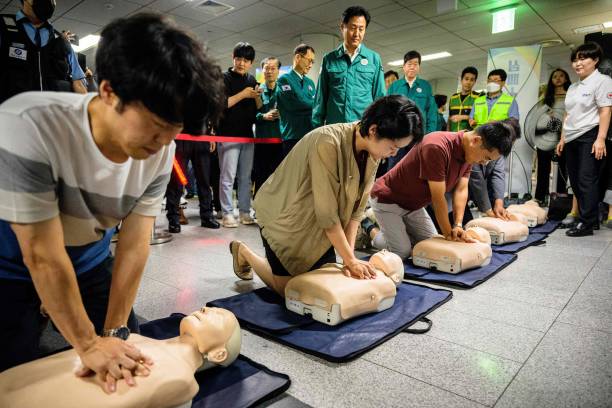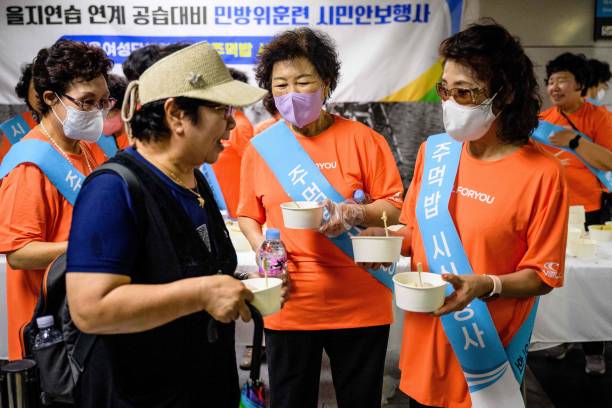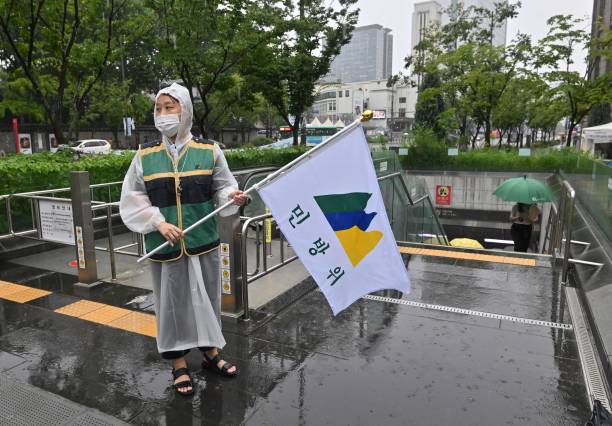South Korea holds first major air raid siren drills in six years
Exercise that aims to prepare citizens in event of an attack by North Korea met with mixed reception
Your support helps us to tell the story
From reproductive rights to climate change to Big Tech, The Independent is on the ground when the story is developing. Whether it's investigating the financials of Elon Musk's pro-Trump PAC or producing our latest documentary, 'The A Word', which shines a light on the American women fighting for reproductive rights, we know how important it is to parse out the facts from the messaging.
At such a critical moment in US history, we need reporters on the ground. Your donation allows us to keep sending journalists to speak to both sides of the story.
The Independent is trusted by Americans across the entire political spectrum. And unlike many other quality news outlets, we choose not to lock Americans out of our reporting and analysis with paywalls. We believe quality journalism should be available to everyone, paid for by those who can afford it.
Your support makes all the difference.South Korea has held nationwide air defence drills for the first time in six years in a bid to prepare citizens amid growing nuclear and missile threats from neighbour North Korea.
The 20-minute-long exercise kicked off at 2pm local time on Wednesday with sirens blaring on a rainy, but hot summer afternoon in downtown Seoul. The air raid alarm remained in effect for 15 minutes as community leaders in yellow jackets signalled pedestrians to seek shelter.
While Subway trains operated normally during this time, passengers deboarding at stations were not allowed to leave until the alarm was phased off. School officials also led students to take shelter in low-lying hallways, reported Korea Times.
But many people on the street appeared to ignore the calls or heed requests to find designated shelter.
Park Joo-ui, a community leader of the Jongno district in Seoul who passed out leaflets to notify the public about the drill said he was baffled by public indifference.
“How can we be prepared for crisis when we don’t get support from our people during this drill? People are just not interested,” the 69-year-old said.
“I didn’t know about the drill. And people don’t seem to care about it much. I don’t believe there will be an actual war either,” said Na Eun, a 52-year-old architectural designer.
While participation in the drill was not mandatory, it was organised for the first time since August 2017 to raise awareness about air raids.
In late May, the government caused panic among some residents and angered them when it issued a false air-raid alarm and evacuation warning following a failed satellite launch by North Korea, even though the capital was far off the rocket’s trajectory.

“If North Korean soldiers suddenly invade, confusion will lead to more casualties,” barista Ahn Tae-hong told New Strait Times. “That is why we must train well.”
Choi In-ho, a 62-year-old travel agent, lamented about the attitude towards the drill. “We are always in confrontation with North Korea, but we’ve become too complacent about it,” he was quoted as saying by AFP.
Around 500 multi-use facilities such as large supermarkets and movie theatres participated in the drill, while train, airplane and ferry services operated normally. Drivers in about 200 areas nationwide had been told to pull to the side of the road.

At a large office building’s basement parking lot in Seoul, hundreds of office workers gathered following instructions of civil defence instructors through megaphones, with some sipping coffee and others complaining about no air conditioning.
“Well, I don’t know if this is going to happen, but if there’s a bombing, this kind of shelter is useless, though it is still useful to know where those shelters are through the drill,” a female banker said, asking not to be named.

About 57 regions designated as special disaster zones due to rain from cyclone Khanun were exempted.
In some regions bordering North Korea, residents faced additional scenarios, including chemical, biological and radiological training, wearing a gas mask and using emergency food rations, reported Reuters.
South Korean president Yoon Suk-yeol visited Command Post Tango, a bunker complex for the US-South Korea combined forces, and said, according to his office, that the joint drills are a “source of power to deter North Korea’s provocations”.
The Ulchi civil defence exercises, aimed at preparing the residents for aerial offence scenarios, were launched in 1969 in the wake of a raid by North Korean commandos into the presidential compound in Seoul.
There are about 17,000 shelters installed across the country with a 52-million population.
Additional reporting by agencies




Join our commenting forum
Join thought-provoking conversations, follow other Independent readers and see their replies
Comments